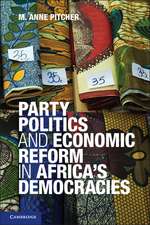Globalization and Business Politics in Arab North Africa: A Comparative Perspective
Autor Melani Claire Cammetten Limba Engleză Paperback – 28 iul 2010
Preț: 284.98 lei
Nou
Puncte Express: 427
Preț estimativ în valută:
54.54€ • 56.73$ • 45.02£
54.54€ • 56.73$ • 45.02£
Carte tipărită la comandă
Livrare economică 12-26 aprilie
Preluare comenzi: 021 569.72.76
Specificații
ISBN-13: 9780521156264
ISBN-10: 0521156262
Pagini: 286
Dimensiuni: 152 x 229 x 16 mm
Greutate: 0.39 kg
Editura: Cambridge University Press
Colecția Cambridge University Press
Locul publicării:New York, United States
ISBN-10: 0521156262
Pagini: 286
Dimensiuni: 152 x 229 x 16 mm
Greutate: 0.39 kg
Editura: Cambridge University Press
Colecția Cambridge University Press
Locul publicării:New York, United States
Cuprins
Part I. The Framework: 1. Rethinking globalization and business politics; 2. Globalization and integration in international apparel manufacturing networks: the new politics of industrial development; Part II. The Institutional Context: 3. Business and the state in Tunisia: statist development, capital dispersion, and preemptive integration in world markets; 4. Business in the state in Morocco: business penetration of the state and the genesis of the 'fat cat'; Part III. Globalization and Institutional Change: 5. Business as usual: state-sponsored industrialization and business collective inaction in Tunisia; 6. Fat cats and self-made men: class conflict and business collective action in Morocco; 7. Globalization, business politics, and industrial policy in developing countries.
Recenzii
'Melani Claire Cammett's book provides the reader with a clear and very accessible description of the economic problems and current transformations occurring in the North African countries … altogether it provides a stimulating and pleasurable read … Cammett's study will become an important voice in discussions on the economic future not only of the Maghreb, but of the whole Middle East.' Political Studies Review
'… the book is an important contribution to comparative political economy, regional analysis of North Africa, as well as the study of business-government relations. From the first chapters one can observe the thorough work of the author and the clever case selection … The author's rigorous historical analysis allows us to have a better understanding of business behavior in Morocco and Tunisia.' Comparative Sociology
'Melani Cammett has provided a superb account of the impact of globalization on manufacturers in developing countries. Focusing on the cases of Tunisia and Morocco, and drilling down into the countries' textile and apparel sectors, Cammett offers a nuanced and provocative analysis of private-sector responses to state policy and trade liberalization in the 1980s and 1990s … Globalization and Business Politics in Arab North Africa is an invaluable, stimulating scholarly contribution.' Perspectives on Politics
'Professor Cammett has presented a richly documented analysis of the domestic conditions under which forces of global competition may encourage business groups in developing countries to organize collectively … It conveys a subtle appreciation of the conditions under which neo-liberal economic reform may or may not engender collective political capacities of business communities.' Middle East Journal
'… the book is an important contribution to comparative political economy, regional analysis of North Africa, as well as the study of business-government relations. From the first chapters one can observe the thorough work of the author and the clever case selection … The author's rigorous historical analysis allows us to have a better understanding of business behavior in Morocco and Tunisia.' Comparative Sociology
'Melani Cammett has provided a superb account of the impact of globalization on manufacturers in developing countries. Focusing on the cases of Tunisia and Morocco, and drilling down into the countries' textile and apparel sectors, Cammett offers a nuanced and provocative analysis of private-sector responses to state policy and trade liberalization in the 1980s and 1990s … Globalization and Business Politics in Arab North Africa is an invaluable, stimulating scholarly contribution.' Perspectives on Politics
'Professor Cammett has presented a richly documented analysis of the domestic conditions under which forces of global competition may encourage business groups in developing countries to organize collectively … It conveys a subtle appreciation of the conditions under which neo-liberal economic reform may or may not engender collective political capacities of business communities.' Middle East Journal
Notă biografică
Descriere
Pre-economic liberalization relations between business and the state condition how groups organize before large-scale economic change.
















